ECHOcommunity更新
ECHO North America TAD 1 April 2024 2024-03-12
Hurry and sign up to join us for our Introduction to Tropical Agriculture Development class at ECHO North America. Classes are April 2-5 for TAD I, if you would like to also join us the following week for TAD II: Syntropical Agroforestry (April 9-12) you can bundle and save! Click the links below for more information.
Upcoming TAD Event Opportunities in April 2024 at ECHO North America! 2024-03-05
Please join us at ECHO North America during one or both of our upcoming TAD Events. Use the links to find out more information and/or sign up for the events.
East Africa Note 12 Now Available! 2024-02-27
In this issue
- Symposium Shared Lessons, Technologies, and Experience
- Expand and Strengthen the ECHO East Africa Network Member
- Transformative Impact of Internships on Young Individuals
- Support the Mission of Work Through Partnership/Collaboration
- Upcoming Joint Symposium in Juba, South Sudan
Symposium Shared Lessons, Technologies, and Experiences
Harold Msanya
Excerpt:
Grain has been stored in underground pits in North Africa and the Middle East for thousands of years. It is currently a common practice in Sudan, Somalia and Ethiopia. While underground storage pits have been in use since ancient times, they are still relatively unknown, but can be an attractive option for many. Storage pits offer the advantages of relative easy construction, low relative cost, safety from theft, good thermal insulation, and protection from moisture, rodent attack and insect infestation.
Research Update: Options for drying Moringa leaves 2024-02-20
ECHO staff have often fielded questions about ways to easily dry moringa leaves such as "Can you dry moringa leaves at room temperature?" It would be nice, especially if it’s raining outside, to be able to dry moringa leaves by simply placing them on a flat surface in your house. Will the leaves become moldy? Conditions that favor mold are high humidity and heat, combined with poor air circulation. Dr. Motis decided to try drying a handful of moringa leaves in his office since it is an air-conditioned space to see what would happen!
How do you dry moringa leaves? Please share your experience and knowledge with the wider ECHO Community!
MissionAssist shares literacy booklets through ECHOcommunity! 2024-02-13
MissionAssist produces a wide range of adult literacy booklets in four widely used languages: English, French, Portuguese, and Spanish. The booklets cover a range of subjects from health and hygiene to crafts, farming, and practical issues like simple construction techniques. MissionAssist is one of the more recent ECHOcommunity partners sharing content through ECHOcommunity.org and the ECHOcommunity mobile app so that they can serve an even larger audience.
ECHO places a high value on working with partners to 'reduce the friction' of discovering relevant resources quickly by indexing appropriate scientific and technical resources within ECHOcommunity.org. We are always interested in suggestions for new topics or resources that will benefit ECHO network members. Send any observations or suggestions to submissions@echocommunity.org
Early Bird Rate Extended to Feb 9th! Introduction to Tropical Agriculture Development Course 2024-02-06
ECHO North America | North Fort Myers, Florida
Register now to take advantage of the early bird rate and save! This course covers a broad range of topics relevant to those starting in agricultural development in a tropical environment. The purpose of this class is to expose attendees to several different ideas and concepts.
April 2-5 Register Today
This course is for those interested in preparing for short to long-term involvement in international agriculture development. Topics and discussions will focus on improved food security and agricultural livelihoods for small-scale farmers in developing countries. Participants will be introduced to the complexities related to poverty and community development. They will also be introduced to principles and practices that contribute toward maintaining healthy and productive soil as well as improved water management and crop production.
ECHO North America Regional Impact Center 2024 Training Calendar 2024-01-30
ECHO North America is excited to announce this year's 2024 training calendar. Please join us on the global demonstration farm this year as we learn and inspire together. Located in North Fort Myers, Florida, our training center contains 5 acres of sustainable agriculture demonstrations that act as a living classroom for people heading to the tropics. Our experienced trainers will walk you through topics related to smallholder production in the tropics, syntropic agriculture, agricultural design, and more! If you have any questions, please email study@echonet.org.
Updated Plant Information about Katuk 2024-01-23
After some questions came in from ECHO's network, our agriculture technical and seed bank staff have updated our Plant Information Sheet about kayuk (Sauropus androgynus). Katuk is a perennial green that grows well in lowland, warm regions of the subtropics and tropics. Its leaves are high in protein and taste similar to garden peas. It prefers partial shade and develops into a bushy shrub when the tips are harvested frequently.
Read the whole plant information sheet online
Now Available! ECHO Technical Note #101: Bamboo Load-Centered Wheelbarrow 2024-01-16
A standard wheelbarrow, with the wheel at the front, places about half the weight of the load on the operator. A load-centered wheelbarrow places the wheel in the center of the load, shifting 90% or more of the weight to the wheel instead of the operator. This allows the device to be used for distance hauling on narrow paths. ECHO developed a design that is scaled down to use a bicycle wheel. This load-centered wheelbarrow, pictured in figure 1 and the focus of this document, can be built with bamboo or other locally available material. This document contains instructions for the wheelbarrow that ECHO built and tested, including additional tips for construction and use.
EDN #162 Now Available 2024-01-09
In this issue
- Contour Cultivation and Live Barriers for Small-Scale Farmers
- Taro (Colocasia esculenta)
- From ECHO’s Seed Bank: Oven-Dried Rice as a Desiccant for Seed Drying
- Books, Websites, and Other Resources: ECHOCommunity Mobile App - Resource Management
Contour Cultivation and Live Barriers for Small-Scale Farmers
Robert Walle
Excerpt:
When increasing distances, important things to consider are the barrier species; their effectiveness in soil and water conservation; and the crop space needed. For example, agroforestry trees alone are usually less effective barriers than grasses. In combination, however, they can provide leguminous fodder while conserving soil and water.
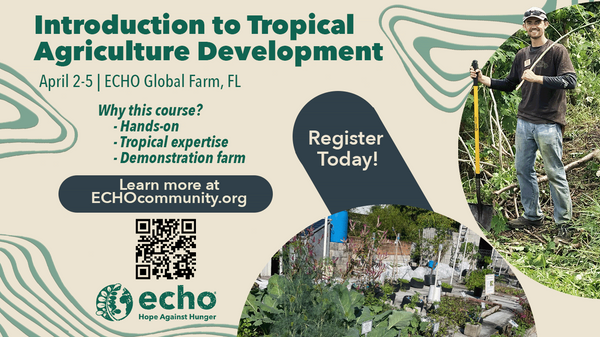
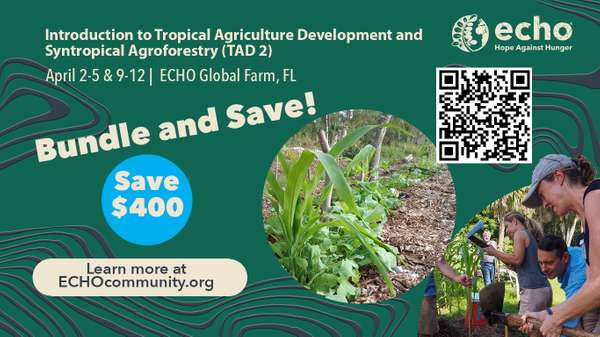
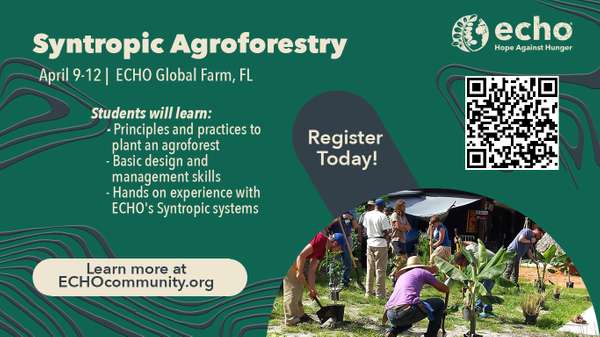
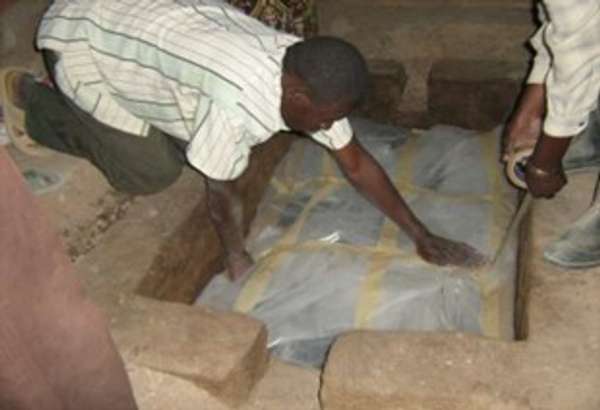

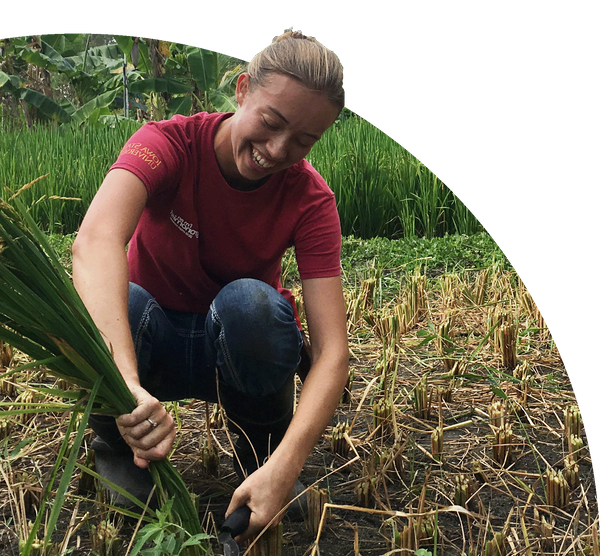
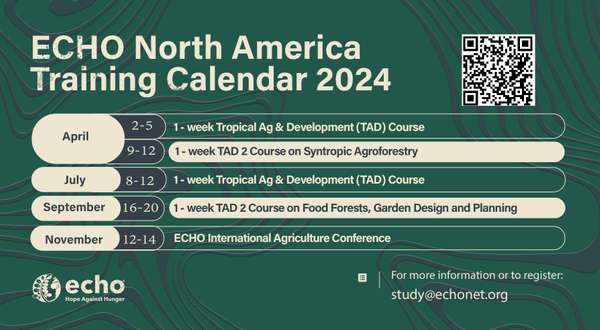
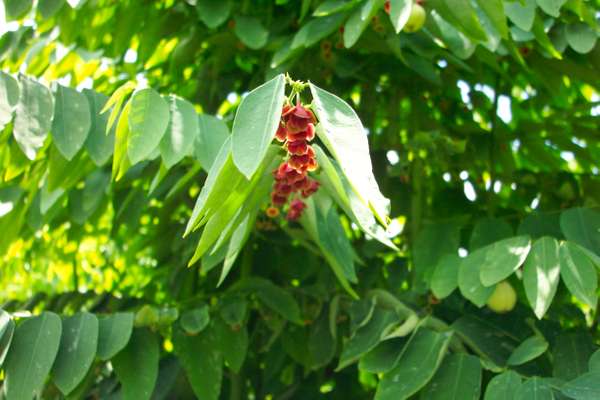
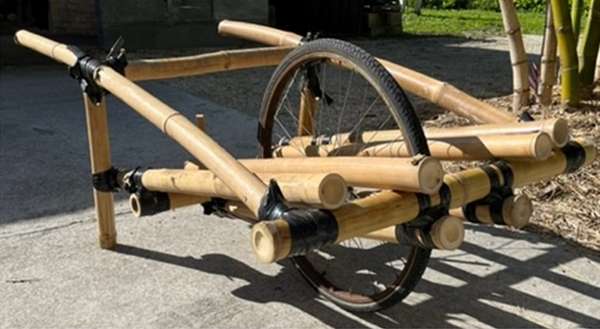
.png?w=600)